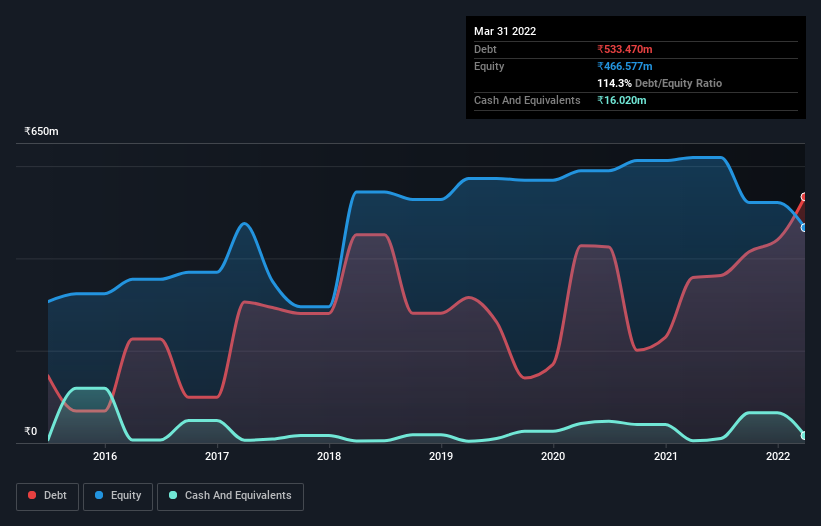Umang Dairies (NSE:UMANGDAIRY) Is Making Moderate Use Of Debt

Warren Buffett famously said, 'Volatility is far from synonymous with risk.' So it might be obvious that you need to consider debt, when you think about how risky any given stock is, because too much debt can sink a company. As with many other companies Umang Dairies Limited (NSE:UMANGDAIRY) makes use of debt. But the more important question is: how much risk is that debt creating?
What Risk Does Debt Bring?
Generally speaking, debt only becomes a real problem when a company can't easily pay it off, either by raising capital or with its own cash flow. If things get really bad, the lenders can take control of the business. However, a more common (but still painful) scenario is that it has to raise new equity capital at a low price, thus permanently diluting shareholders. Having said that, the most common situation is where a company manages its debt reasonably well - and to its own advantage. The first thing to do when considering how much debt a business uses is to look at its cash and debt together.
See our latest analysis for Umang Dairies
How Much Debt Does Umang Dairies Carry?
As you can see below, at the end of March 2022, Umang Dairies had ₹533.5m of debt, up from ₹358.8m a year ago. Click the image for more detail. However, it does have ₹16.0m in cash offsetting this, leading to net debt of about ₹517.5m.

A Look At Umang Dairies' Liabilities
Zooming in on the latest balance sheet data, we can see that Umang Dairies had liabilities of ₹641.8m due within 12 months and liabilities of ₹386.5m due beyond that. Offsetting these obligations, it had cash of ₹16.0m as well as receivables valued at ₹120.3m due within 12 months. So its liabilities outweigh the sum of its cash and (near-term) receivables by ₹891.9m.
This deficit is considerable relative to its market capitalization of ₹1.15b, so it does suggest shareholders should keep an eye on Umang Dairies' use of debt. This suggests shareholders would be heavily diluted if the company needed to shore up its balance sheet in a hurry. When analysing debt levels, the balance sheet is the obvious place to start. But it is Umang Dairies's earnings that will influence how the balance sheet holds up in the future. So when considering debt, it's definitely worth looking at the earnings trend. Click here for an interactive snapshot.
Over 12 months, Umang Dairies made a loss at the EBIT level, and saw its revenue drop to ₹2.0b, which is a fall of 18%. We would much prefer see growth.
Caveat Emptor
Not only did Umang Dairies's revenue slip over the last twelve months, but it also produced negative earnings before interest and tax (EBIT). Its EBIT loss was a whopping ₹154m. When we look at that and recall the liabilities on its balance sheet, relative to cash, it seems unwise to us for the company to have any debt. Quite frankly we think the balance sheet is far from match-fit, although it could be improved with time. Another cause for caution is that is bled ₹114m in negative free cash flow over the last twelve months. So in short it's a really risky stock. When analysing debt levels, the balance sheet is the obvious place to start. But ultimately, every company can contain risks that exist outside of the balance sheet. Be aware that Umang Dairies is showing 5 warning signs in our investment analysis , and 3 of those shouldn't be ignored...
At the end of the day, it's often better to focus on companies that are free from net debt. You can access our special list of such companies (all with a track record of profit growth). It's free.
If you're looking to trade Umang Dairies, open an account with the lowest-cost platform trusted by professionals, Interactive Brokers.
With clients in over 200 countries and territories, and access to 160 markets, IBKR lets you trade stocks, options, futures, forex, bonds and funds from a single integrated account.
Enjoy no hidden fees, no account minimums, and FX conversion rates as low as 0.03%, far better than what most brokers offer.
Sponsored ContentNew: AI Stock Screener & Alerts
Our new AI Stock Screener scans the market every day to uncover opportunities.
• Dividend Powerhouses (3%+ Yield)
• Undervalued Small Caps with Insider Buying
• High growth Tech and AI Companies
Or build your own from over 50 metrics.
Have feedback on this article? Concerned about the content? Get in touch with us directly. Alternatively, email editorial-team (at) simplywallst.com.
This article by Simply Wall St is general in nature. We provide commentary based on historical data and analyst forecasts only using an unbiased methodology and our articles are not intended to be financial advice. It does not constitute a recommendation to buy or sell any stock, and does not take account of your objectives, or your financial situation. We aim to bring you long-term focused analysis driven by fundamental data. Note that our analysis may not factor in the latest price-sensitive company announcements or qualitative material. Simply Wall St has no position in any stocks mentioned.
About NSEI:UMANGDAIRY
Mediocre balance sheet low.
Similar Companies
Market Insights
Community Narratives



